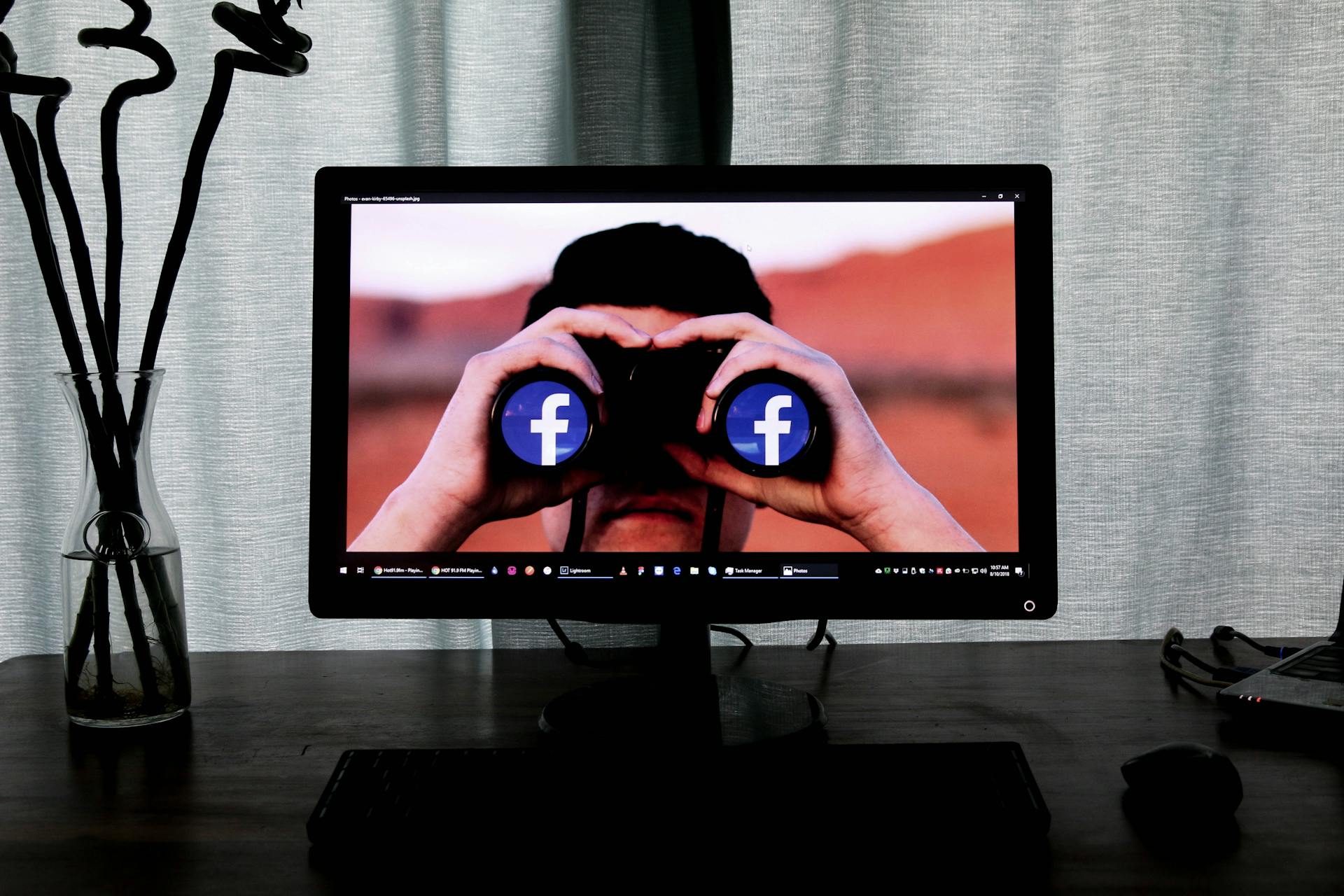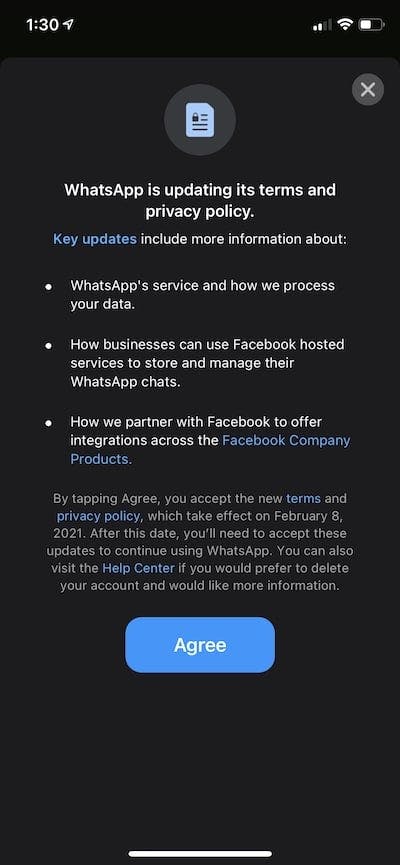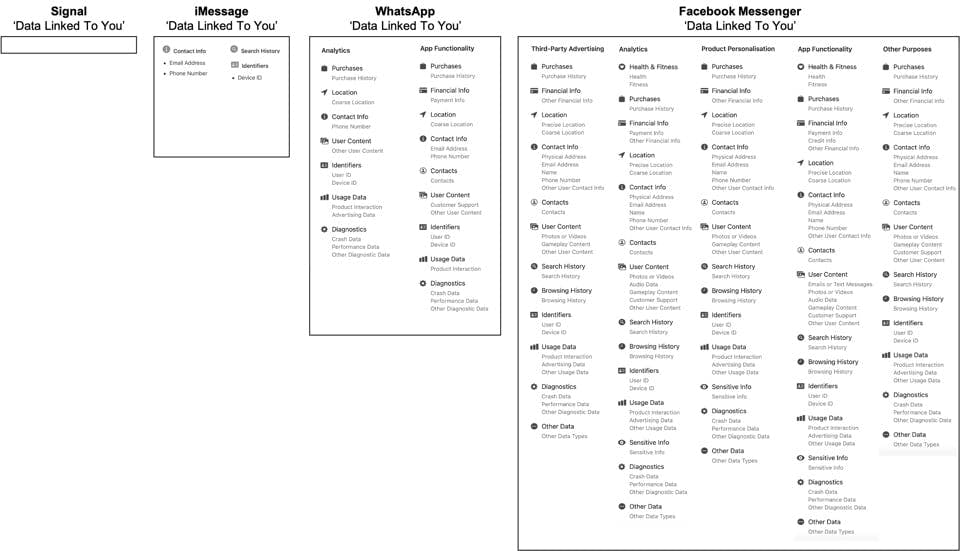Facebook's Shameless Takeover of WhatsApp
by Kartik Chaturvedi

If you have used WhatsApp in the last few days, you might have noticed a prompt in the app to accept new terms and conditions. These new terms allow Facebook to collect more metadata about your WhatsApp conversations, and they will go into effect on February 8th, 2021.

Many users will simply click ‘Agree’ and continue chatting. But it’s crucial to decipher what Facebook has sneakily added to the terms because it affects not only how you use WhatsApp, but also how you use Facebook and the rest of the internet.
In 2014, Facebook bought the viral messaging startup WhatsApp for $19 billion and reduced the price from $0.99 per year to $0. Obviously, Facebook would want to recover the $19 billion investment, but the price tag of free was a way to entice more users to join the app before Facebook showed its true colors. By 2016, it wanted to monetize WhatsApp by leveraging the immense amounts of user data that flow through chats every single day. At that time, Facebook let users opt-out of that data collection.
However, starting February 8th, 2021, users will no longer have a choice. Facebook will begin to collect your metadata from WhatsApp, and the only way to opt out this time is to delete your account.
Why Is This Important?
Very simply, Facebook has turned a once-praiseworthy private messaging app into a data-collecting privacy-invading platform.
It’s worth noting that your messages will remain encrypted, so WhatsApp cannot see your conversations. This used to be one of the biggest benefits of using WhatsApp over SMS or other messaging apps.
However, the problem is that the new terms allow WhatsApp to collect and see almost everything else — your profile, your status, your contacts and their phone numbers, your usage patterns (time of day, duration of chats), your network information (IP address, network provider, connection type), your device data (model, battery level, location, etc.). All this data about your data, or metadata, can reveal a lot about you.
And remember, this is what it can collect about you today. The vague and heavily worded terms shows signs that in the future, WhatsApp plans to introduce more features such as payments, event scheduling, business chat, and more. Those features will only collect more data from you, like which bank accounts you have, how much money you spend, and even what kinds of activities you do.
The most important clause in these new terms is that WhatsApp will share this metadata with its parent company Facebook, and its other companies such as Instagram, and even with some third parties.
“As part of the Facebook family of companies, WhatsApp receives information from, and shares information with, this family of companies. We may use the information we receive from them, and they may use the information we share with them, to help operate, provide, improve, understand, customize, support, and market our Services and their offerings.”
Simply chatting on WhatsApp with friends means giving Facebook and advertisers all the information about your device, your location, your payments, and your daily life. Your privacy is not in Facebook’s best interest, no matter how much it claims otherwise. The more personal data it can collect from you, the more relevant ads it can show you across the Internet, and that increases the chance that you will click or buy something that gives Facebook some commission.
What Can We Do?
If you cannot stop using WhatsApp, or you just don’t want to go through the trouble to switch, you can still continue to use it, as long as you don’t mind giving up your personal data.
For most people though, WhatsApp is good as a worst-case scenario, a last resort. There are better ways to communicate without giving up your privacy, in which you and your data are not the product being sold to advertisers.
What Are the Alternatives?
If you use an Apple device, iMessage is the best way to chat with your friends and family. It is easy to use, extremely well-designed, private, and widely adopted if your contacts are all Apple users.
The best alternative across iOS and Android is Signal, a secure messaging app that is skyrocketing in use since WhatsApp announced the new terms. It has been audited by many security experts around the world. In fact, Signal’s encryption protocol is what powers WhatsApp’s message encryption. Signal is endorsed by Elon Musk, a longtime critic of Facebook, and even former Facebook senior executive Chamath Palihapitiya.
Arattai (Tamil for ‘chit-chat’) is a relatively new messaging app for iOS and Android, created by world-renowned Indian software company Zoho. CEO Sridhar Vembu has said the app is currently in a trial phase. With the formal release in a few weeks, Arattai will bring end-to-end encryption and better performance, and has a chance to become the best home-grown alternative for India — currently WhatsApp’s biggest user base.
For some insight into just how much data WhatsApp and other apps have access to, you can check the app’s information page. On Apple devices, you can see exactly what data points an app can collect from your device. It’s no surprise that WhatsApp and Facebook’s own Messenger app collect the most data, while Apple’s iMessage collects just an email address or phone number to ensure user uniqueness, and Signal collects nothing linked to you.

Read more: These app privacy labels, introduced by Apple in late 2020, were the reason Facebook attacked Apple with full-page ads claiming the labels hurt small business advertising.
WhatsApp’s new policy means the end of a simple and secure way to chat with almost anyone around the world. The belief at Facebook is that the app has strength in numbers as the world’s #1 chat app, and vague terms and policies will discourage users from understanding the implications. This will allow endless data collection that can be used to serve you ads and make Facebook a bigger profit.
These are moves Facebook has gotten away with in the past, but today is a different world than 5 or 10 years ago. With increased awareness and concern for privacy among users, Facebook might have underestimated how WhatsApp users will react to the forced takeover of their favorite chat app. WhatsApp was a very personal experience — just you and your conversations. No ads, no noise, and no tracking. Now that WhatsApp does not offer that experience, it is only a matter of time before users switch to an app (and a company) that actually does.
Together, the world can send a strong signal to Facebook.
Kartik's Newsletter
Subscribe to get science and tech news, new posts, and the latest updates from me.